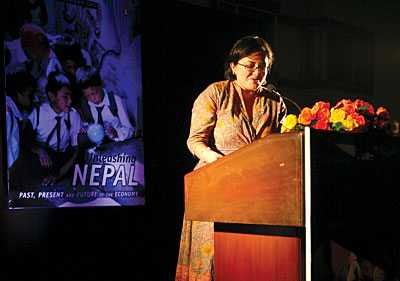 KIRAN PANDAY |
This summer, there have been several high-profile book launches in Kathmandu, in both English and Nepali. Readings and creative writing sessions in English are now a feature of the capital's cultural circuit rather than the exclusively expatriate activity of the past. This year's 14th Education and Book Fair, while not quite a roaring success, expects upto 50,000 visitors through the week, up from 35,000 last year.
Are they long gone, those days when your uncle would sidle up to your father at a family gathering and press on him two copies of his latest literary effort? When English-language literature was the Hardy Boys, then the latest pulp from Stephen King, and eventually Gabriel Garcia Márquez? The advent of the Salman Rushdies and the Vikram Seths meant little to the average Nepali reader back then, and homegrown English-language prose fiction was mostly limited to children's books and vanity ventures. At a time when Nepal was slowly but surely moving into the slipstream of globalisation, it was yet to find its voice on the international literary stage.
Then along came Samrat Upadhyay. With the 2001 publication of Arresting God in Kathmandu, the Indiana-based creative writing professor became the first Nepali writer to be published in the West. Accolades flowed even as some Nepalis feigned horror at his earthy descriptions of small-town love and despair. Earlier that year, to less fanfare, Manjushree Thapa had published The Tutor of History. Local compilations such as Crow and An Other Voice seemed to hint at the talent bubbling below the surface. For young aspiring writers in Nepal, it was as if the floodgates had opened.
Except it was something of a false dawn, despite the assertions of the maturing Nepali media and arts scene. In most of the decade that followed these breakthrough publications, no other Nepalis Writing in English (NWEs) made a splash abroad. The scene wasn't dormant; Sushma Joshi, Sheeba Shah, Ajit Baral and Manan Karki came out with short story compilations and novels with publishers Nepali, Indian and Irish (!). Nepali-language literature, too, was undergoing something of a renaissance in production and marketing. But the combined impact of this late flurry at the end of the decade was not in the same league as the debuts by Thapa and Upadhyay. Rupa's championing of Nepali authors improved their distribution, but little more. A lack of editing was starkly evident in its highly uneven shorts collection New Nepal, New Voices, and 2010's novels from Sheba Shah and Upadhyay.
There's no doubt an international readership, through the proxy of publishers based in India, is slowly discovering NWEs. If Rupa's approach has been flawed, at least it is based on a genuine belief that NWEs are marketable. Publisher at Penguin India, Ravi Singh, maintains it's not just Nepali writers and the places they write about that are attractive to Indian publishers, it's also the economics, stupid: they are more likely to make their money back on a Nepali author than a midlist Indian author.
But are we jumping the gun to say that NWEs have come of age? Nepali readers may be more forgiving of poorly edited works, because their hunger for Nepali prose fiction in English overrides an undeveloped critical instinct. International readers will be less patient, especially with a ready supply of polished subcontinental fiction at hand. So while a push to publish NWEs at minimal cost and effort might have immediate benefits, in the long term it will stymie the growth of the industry and limit the development and reach of literature from Nepal.
It's not as simple as hiring an editor or two, or convincing Indian publishers to make better use of editors. Until the media and publishers understand how a lack of content editing, copyediting and proofreading can completely undermine the integrity of a project, authors will continue to fall short of the best they can be.
Nepal's literary circles, in both Nepali and English, compound the editorial black hole by too often refusing to take or provide constructive feedback. The wholesale exaltation of patently mediocre works reveals an ignorance of what counts as quality, and perhaps also masks insecurities about one's own work. If the energy and imagination of Nepali writing in any language is to get the attention it deserves, it has to earn it through the hard graft of editing.
Exposure to the wider world, of not only English-language authors but also those working in Nepali languages (through translation), could compel a more reflexive attitude towards one's own work and that of others. But there will also have to be a conscious attitudinal shift, whereby healthy competition becomes the order of the day, both within and outside of Kathmandu's small English and Nepali literary clique. Only then will the promise hinted at in the novels of Upadhyay and Thapa come to fruition.
READ ALSO:
Win-win-win, ALOK BOHARA
Good guys and bad guys, PUBLISHER'S NOTE
Patronising behaviour, PRASHANT JHA
Changing inheritance laws, ARTHA BEED
For the love of books, PAAVAN MATHEMA



